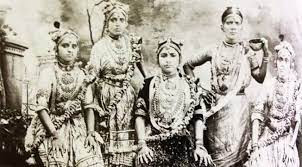
The Devadasi (Mathamma) cult in
the state of Andhra Pradesh (AP) is a historical and complex practice that has
deep roots in the region’s religious, social, and cultural traditions. The
Devadasi (Mathamma) system traditionally involved the consecration of young
girls, who were dedicated to the service of deities in temples. While the
system has been largely outlawed in India, particularly in the 1980s, its
influence still lingers in certain regions, including Tirupati district in
AP.
Understanding
the Devadasi (Mathamma) Cult:
- Devadasi
(Mathamma) Tradition:
o The word "Devadasi
(Mathamma)" literally means "servant of God" in
Sanskrit, signifying the dedication of young girls (usually from impoverished
or marginalized backgrounds) to the service of a temple deity.
o Historically, Devadasi (Mathamma)s were
girls who were ceremonially "married" to a god or goddess,
particularly in temples. They were responsible for performing religious
rituals, singing, dancing, and maintaining the temple premises.
o The Devadasi (Mathamma) system was
rooted in ancient temple practices, particularly in the Tamil and
Telugu-speaking regions, and the tradition spread across southern India. In
AP, it had strong cultural and religious significance in places like Tirupati,
Srikalahasti and other temple towns.
- Role
of Devadasi (Mathamma)s in Temples:
o The Devadasi (Mathamma)s played a
central role in temple activities. They were highly trained in classical dance
forms like Bharatanatyam and Odissi, and would
perform in front of deities during festivals, rituals, and other temple
functions.
o Their role was not just confined to
performance; they were also seen as custodians of temple traditions,
ensuring that religious ceremonies were performed in a prescribed manner.
o The temple was viewed as their
spiritual home, and they were often highly respected within the religious
community.
- Social
and Cultural Context in Tirupati:
o Tirupati, a major pilgrimage
destination and the site of the famous Tirumala Venkateswara Temple,
has a significant historical connection to the Devadasi (Mathamma) system. This
temple, dedicated to Lord Venkateswara, is one of the most prominent temples in
India, and its rituals, music, and dance have historically been central to
temple culture.
o In Tirupati, Devadasi (Mathamma)s were
primarily dedicated to the Tirumala temple and other smaller
temples in the region. They performed temple dances (often as part of the Bharatanatyam tradition)
and sang devotional songs to honor the deity.
o Over time, some Devadasi (Mathamma)s in
this region were also seen as women of high cultural and artistic
standing, although their lives were often marked by social challenges.
- Decline
and Abolition:
o The Devadasi (Mathamma)
system began to decline during the British colonial period, especially
in the 19th and early 20th centuries, when reform movements and social
activists, such as Veerasalingam Pantulu and Rajaji,
raised awareness about the exploitation and degradation of women within the
system.
o In the 1940s and 1950s, there was
increasing pressure for legal reforms, which culminated in the Devadasi
(Mathamma) (Abolition) Act of 1988 in Andhra Pradesh, making the
dedication of girls to temples illegal. This act sought to end the exploitation
and abuse that Devadasi (Mathamma)s often suffered, including forced
prostitution and exploitation by wealthy and powerful individuals.
o Despite this legal abolition,
remnants of the Devadasi (Mathamma) system continue to persist in some rural
areas, including Tirupati, where the practice is sometimes clandestinely
carried out.
- Modern-Day
Issues and Legacy:
o Even though the formal dedication
of girls to temples has largely ceased, the Devadasi (Mathamma)
system’s legacy remains in the form of social stigmas,
economic exploitation, and the perpetuation of caste-based practices.
o Devadasi (Mathamma)s today are
sometimes seen as women who were once dedicated to temple service but are left
without support or resources after the abolition of the system. Many Devadasi
(Mathamma)s continue to face economic hardship, marginalization, and lack of
social security.
o In modern-day Tirupati, the cultural
and spiritual contributions of the former Devadasi (Mathamma)s to
temple music, dance, and rituals are still recognized, but the exploitation and
abuses associated with the practice have led to a shift in perception.
- MARGADARSHI
(NGO) Intervention and Rehabilitation Efforts:
o After
the abolition of the Devadasi (Mathamma) system, MARGADARSHI NGO along with the
government and other non-governmental organizations (NGOs), has been working
to rehabilitate former Devadasi (Mathamma)s and provide them
with educational opportunities, vocational training, and social
support to help them reintegrate into society.
o Efforts
have been made to empower women, offering alternative livelihoods
and social security schemes to prevent exploitation and abuse.
- Current
Status of Mathammas:
o In Tirupati,
the Devadasi (Mathamma) system is no longer an open or institutionalized practice,
but its cultural and historical traces can still be found. The contributions of
former Devadasi (Mathammas), especially in the temple traditional
performance, continue to be appreciated in the region.
o In
the modern era, the focus has shifted towards preserving the
traditional art forms while ensuring the dignity and
empowerment of women in the region. Efforts are ongoing to address
the historical exploitation that was part of the Devadasi
(Mathamma) system.
- Support
sought:
o We request
your support to help us provide these women with the
necessary tools, materials, and guidance to start their own tailoring
businesses. By doing so, we can significantly improve their quality of life,
reduce their dependency on low-wage jobs, and contribute to the social and
economic upliftment of former Child Mathas in Tirupati..